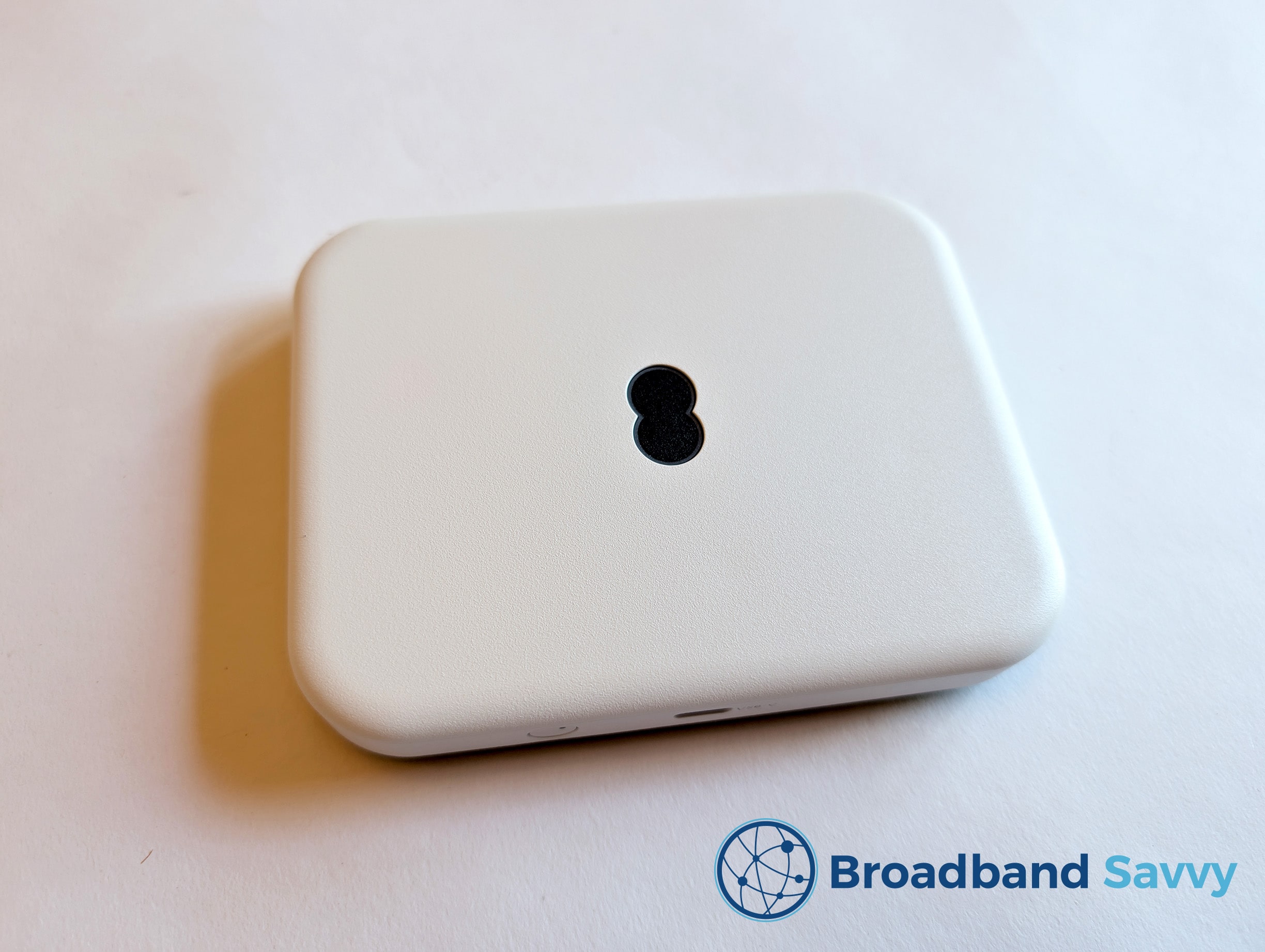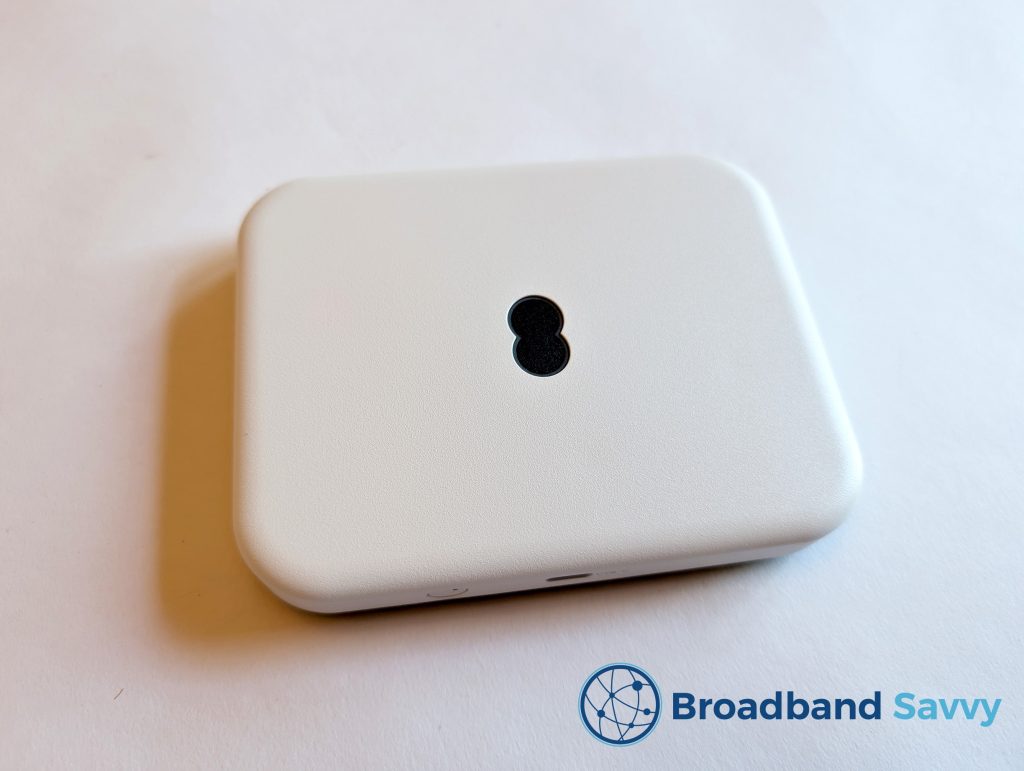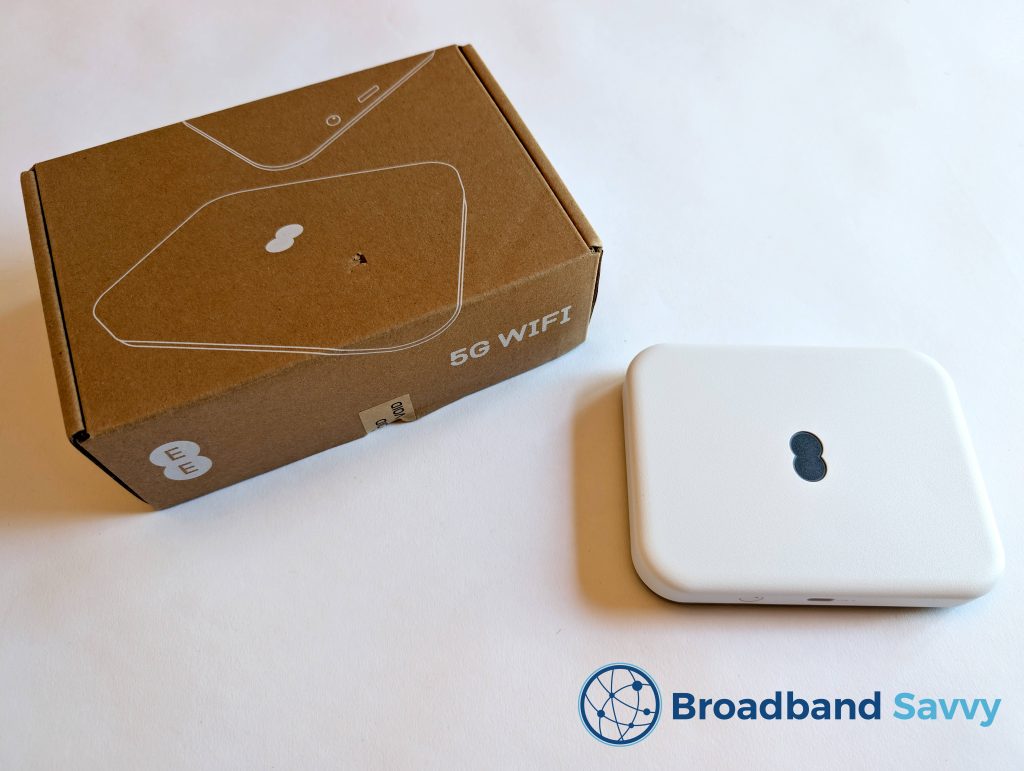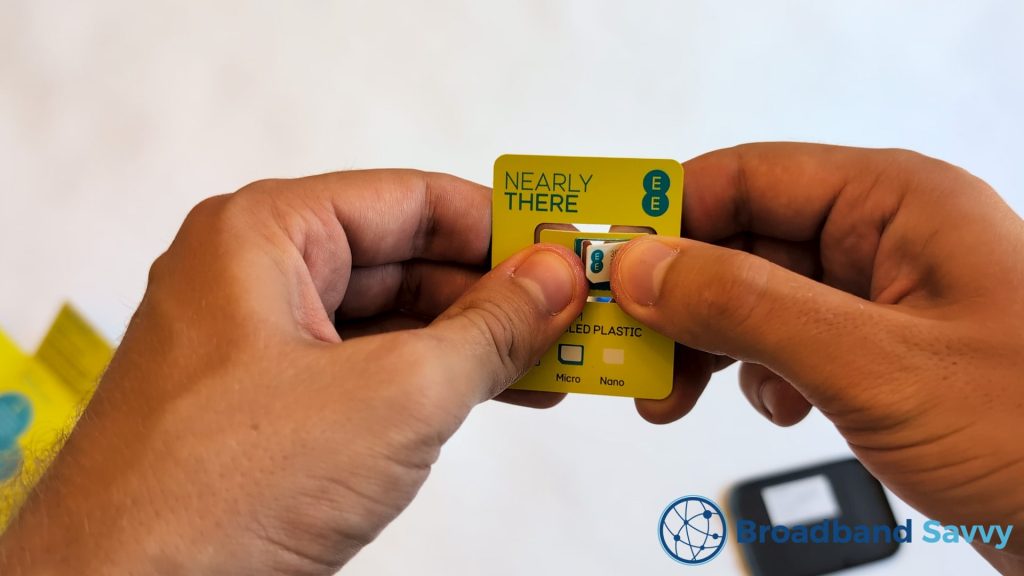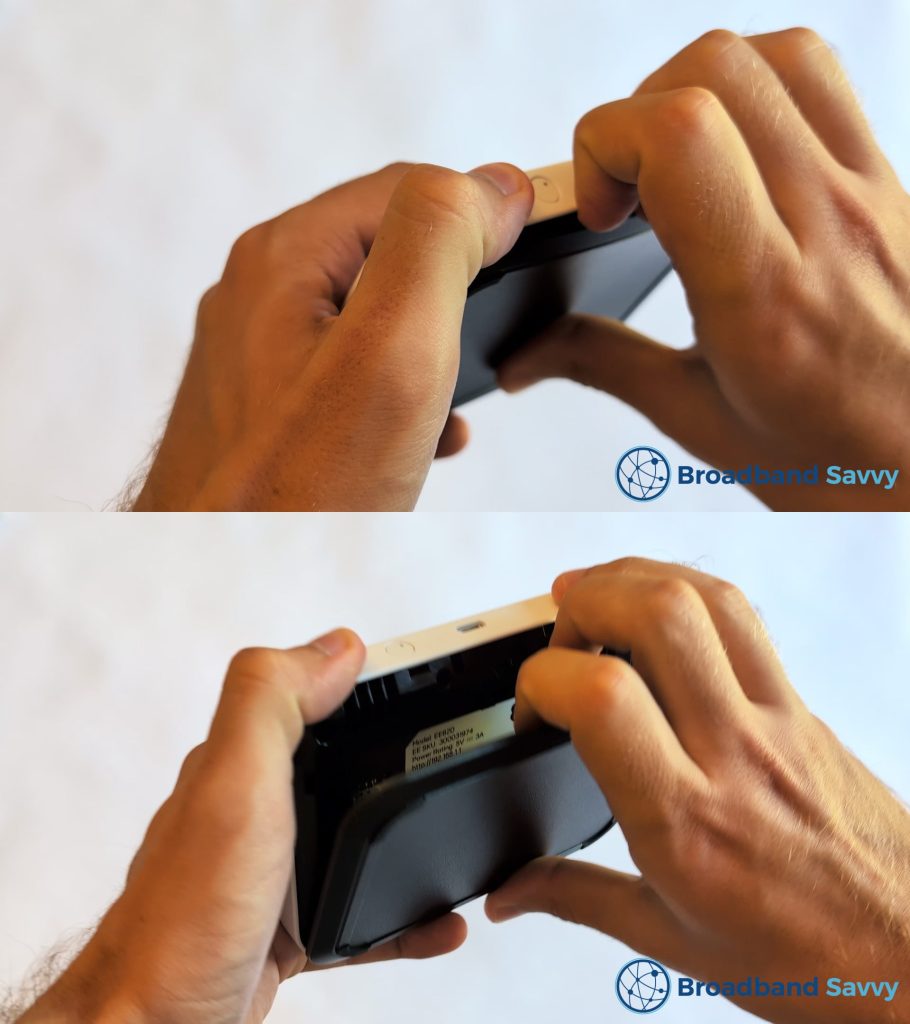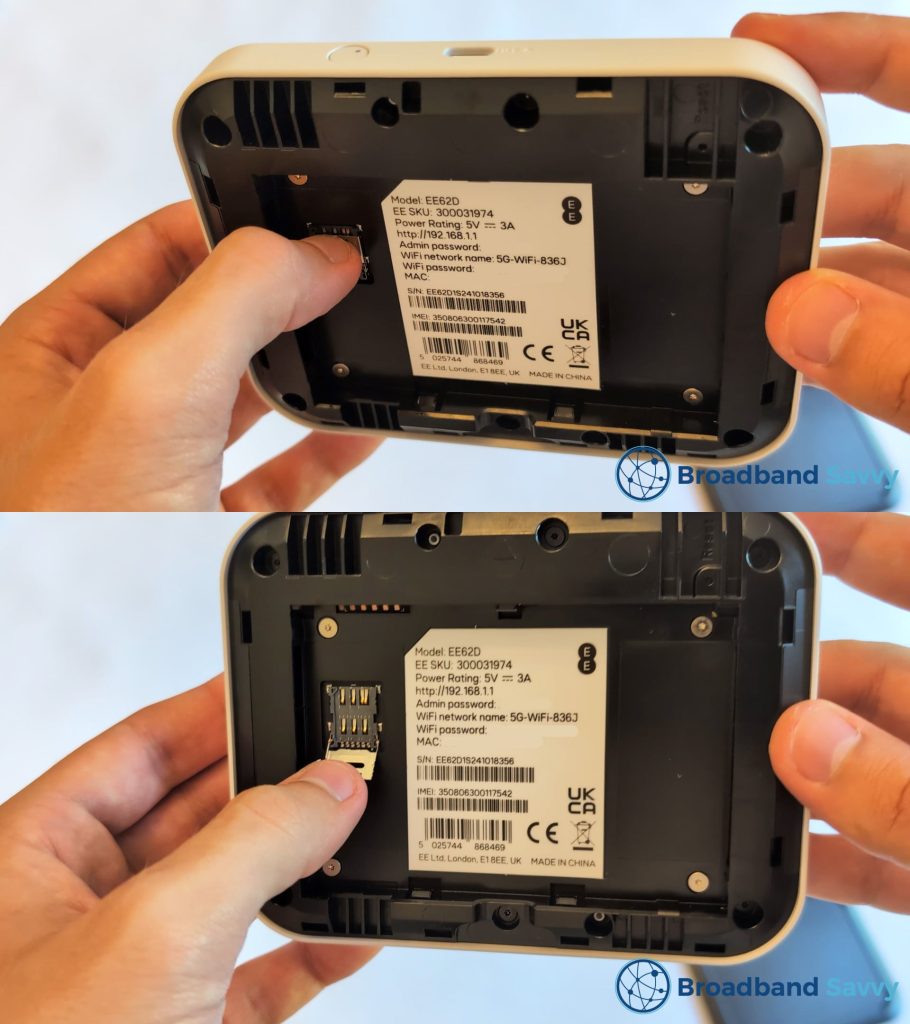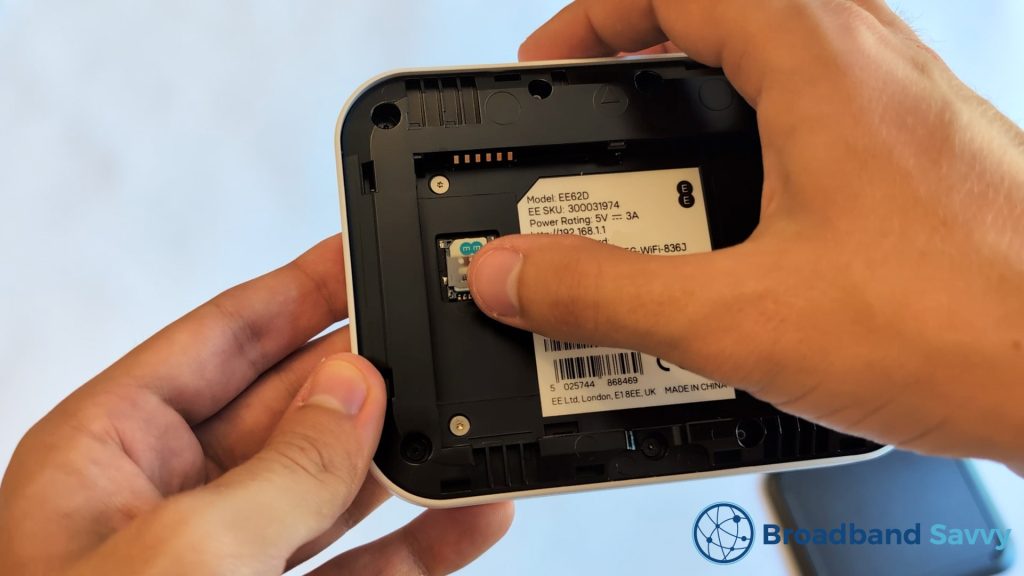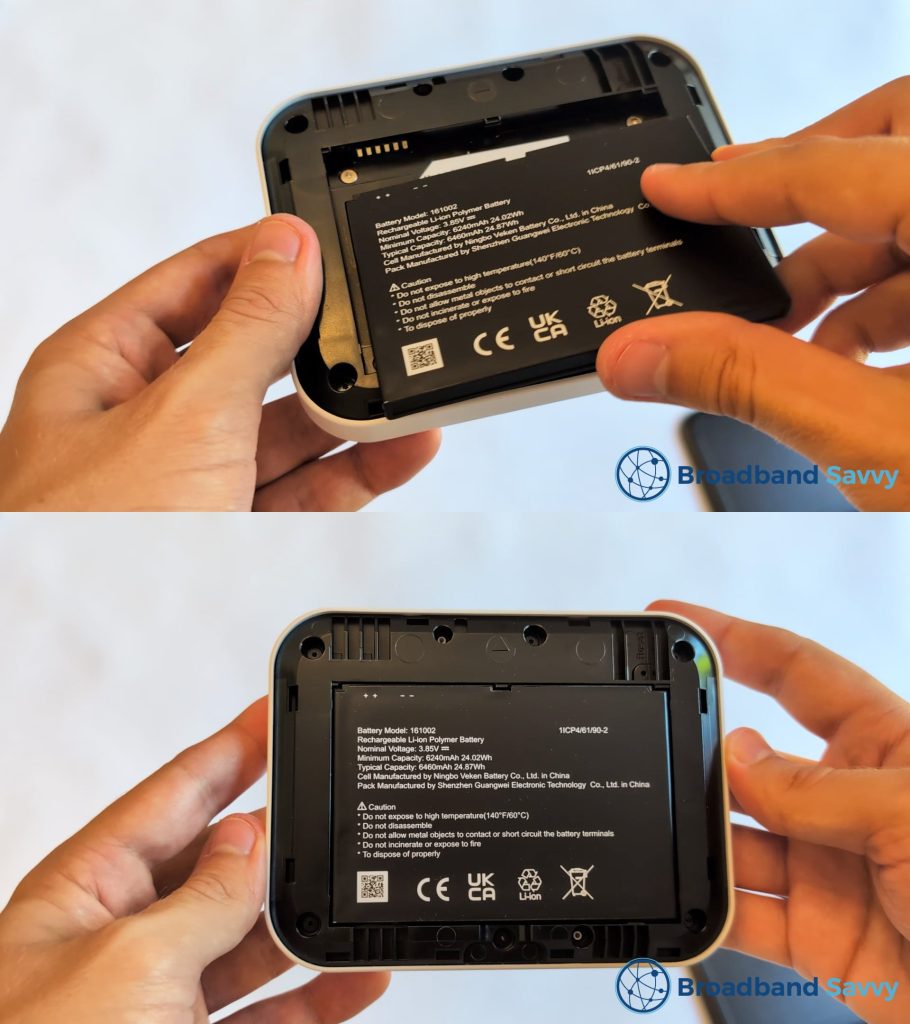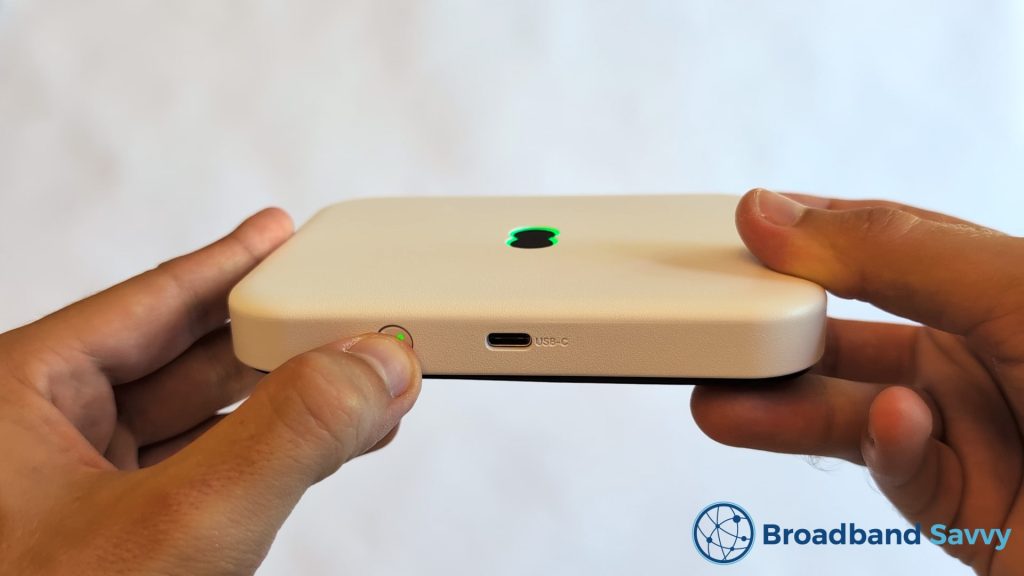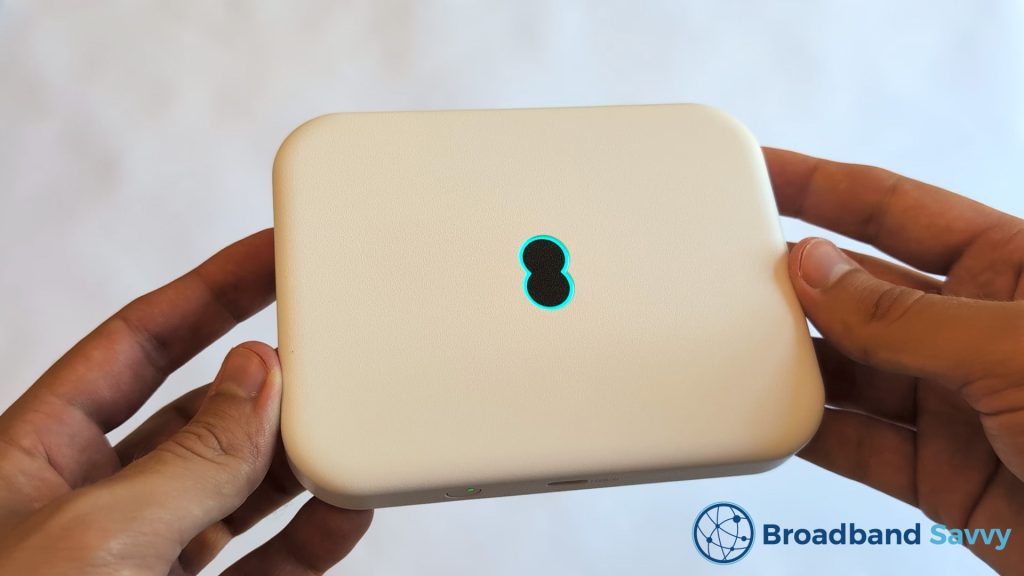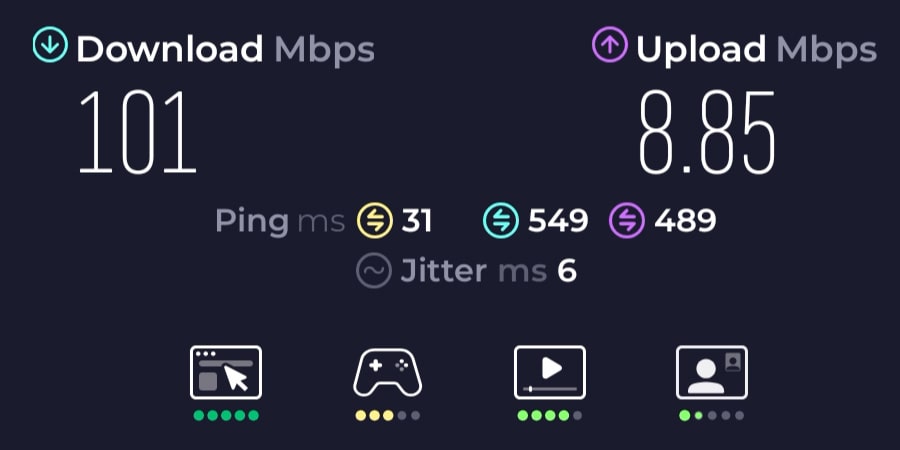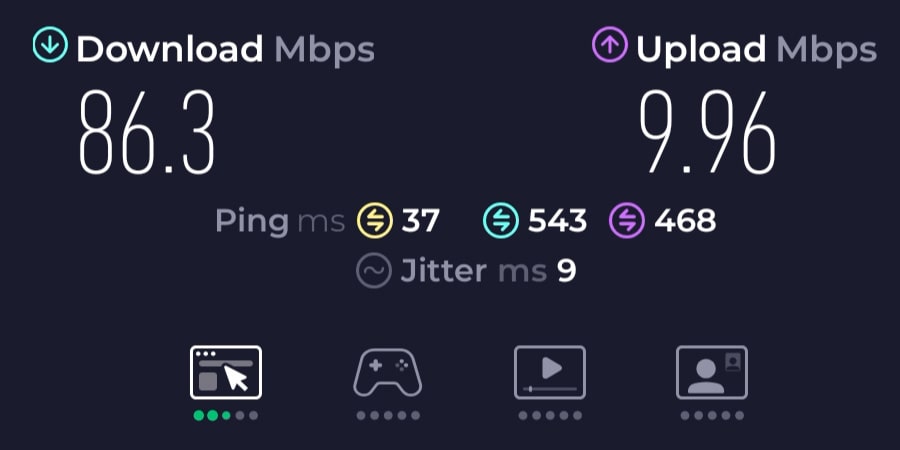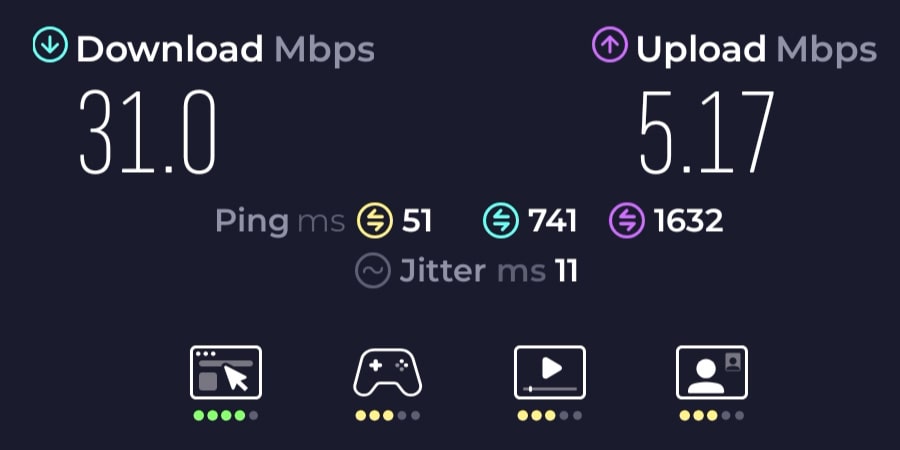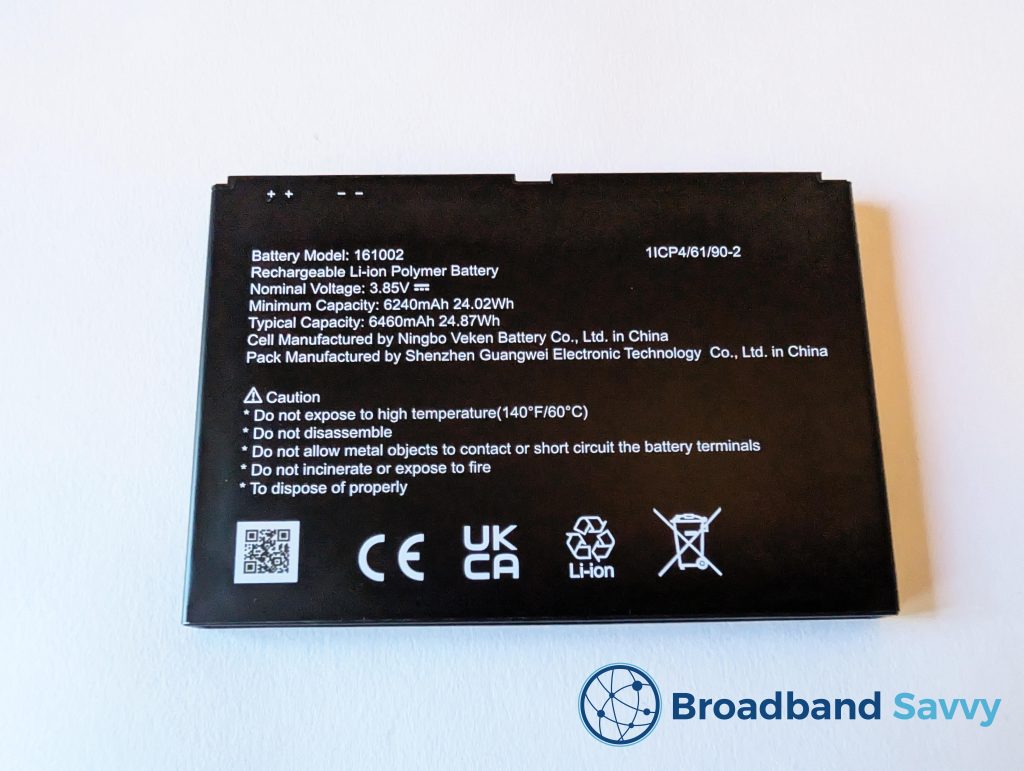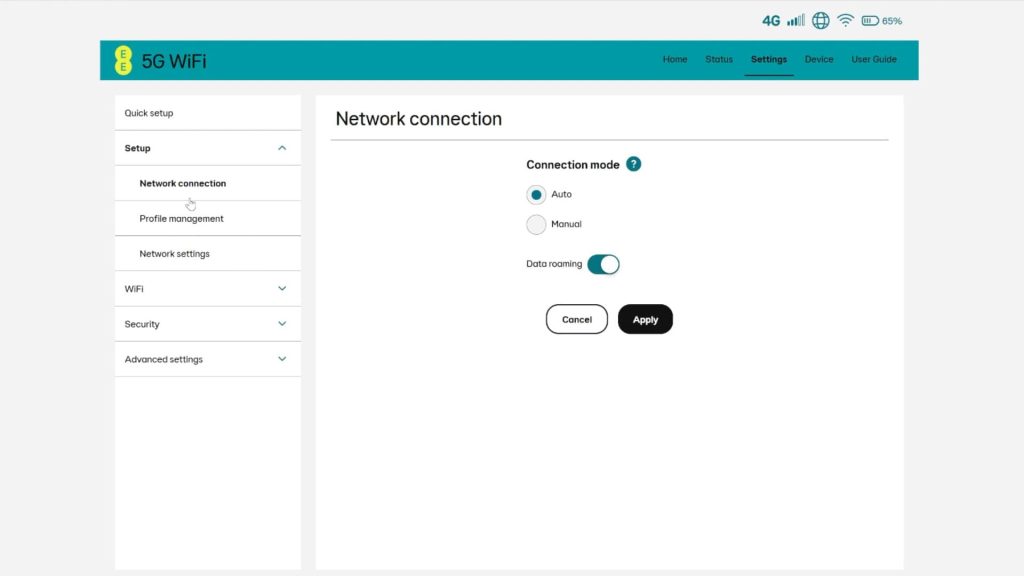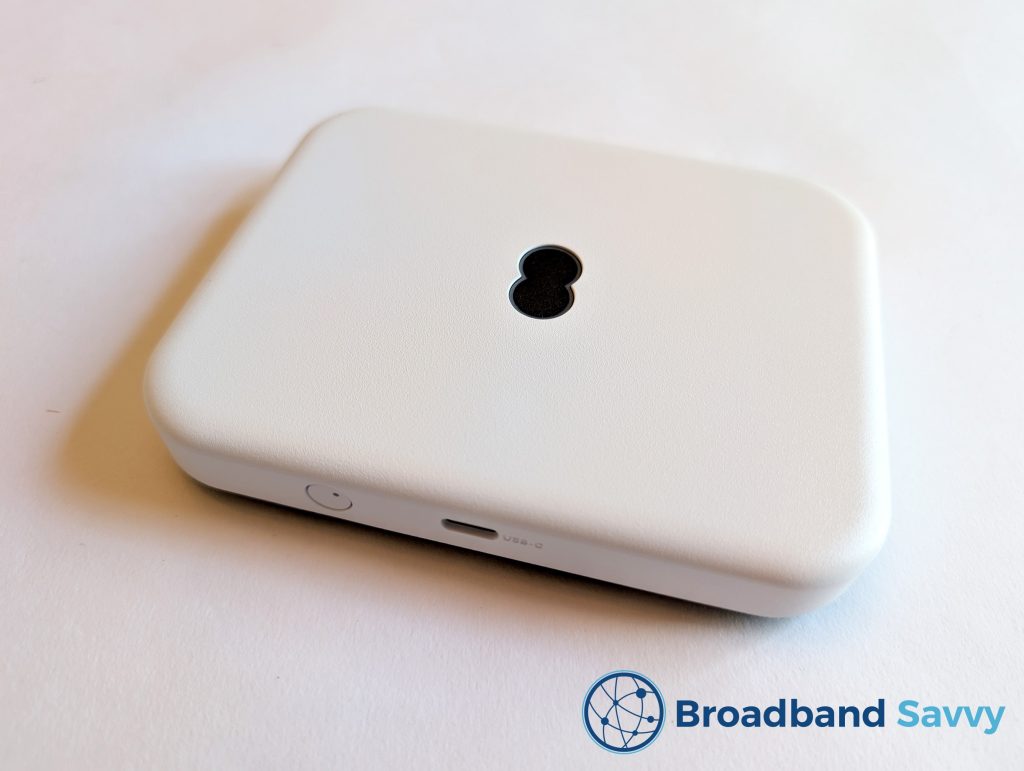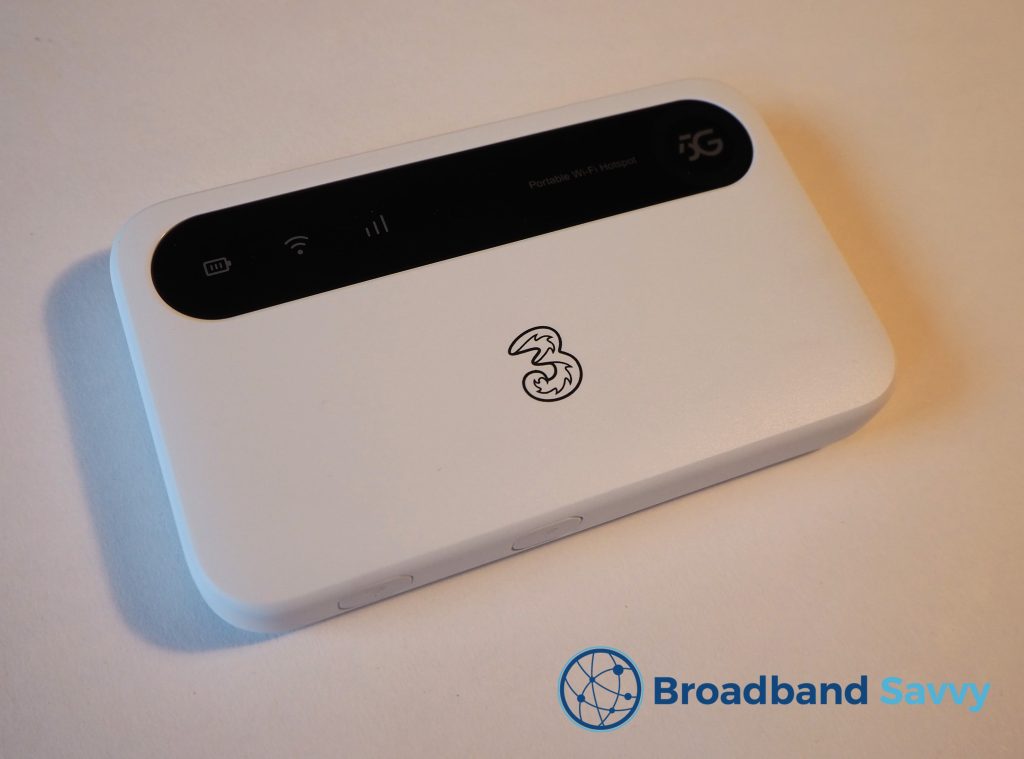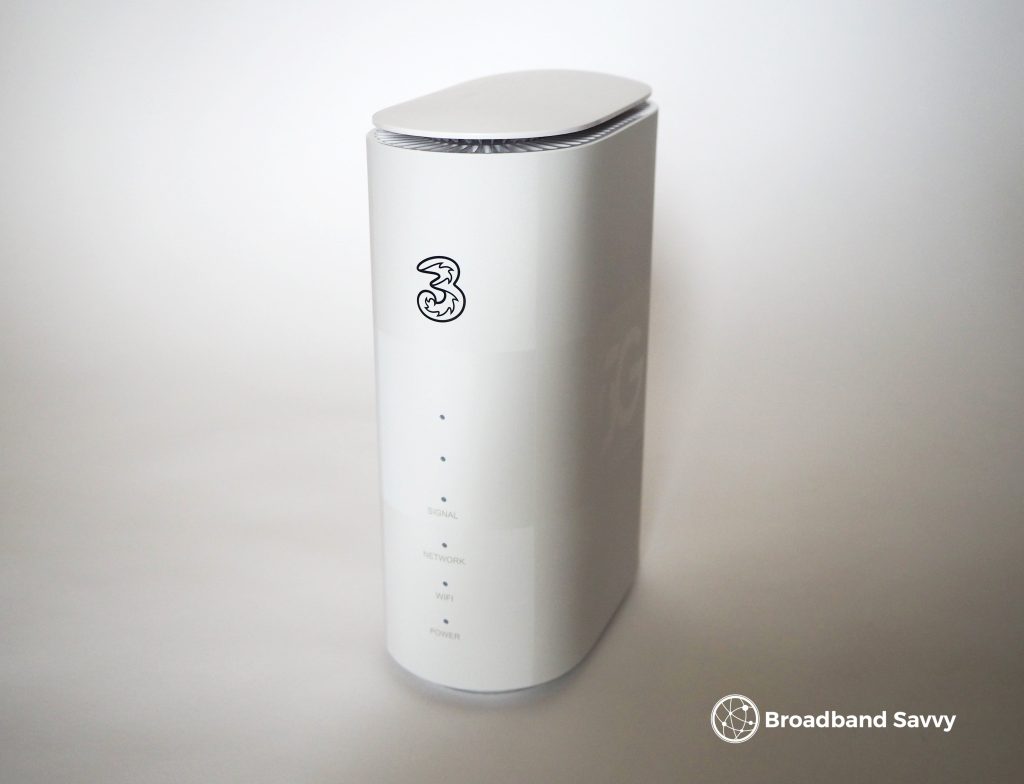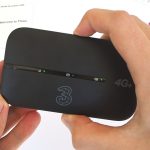Considering buying EE’s 5G mobile Wi-Fi device?
In this article, we’ve reviewed EE 5G MiFi, based on its download speeds, battery life, value for money, and more, to see if you should buy it.
Before we begin, Three MiFi offers faster speeds for a lower price than EE at the moment, so we recommend checking out their 5G MiFi deals as well.
Contents
- EE 5G MiFi overview
- EE 5G MiFi unboxing and setup
- EE 5G MiFi speed tests
- EE 5G MiFi WiFi signal strength
- EE 5G MiFi battery life
- Can I use EE MiFi abroad?
- EE 5G MiFi value for money
- Is EE 5G MiFi any good? Our verdict
- EE 5G WiFi alternatives
- Conclusion
EE 5G MiFi overview
| Brand | EE |
| Name | 5G WiFi 2 |
| Model | EE62D |
| Dimensions | 131x102x20mm |
| Weight | 261g |
| Battery capacity | 6460mAh |
| Maximum connected devices | 64 |
| WiFi | 2.4GHz/5GHz/6GHz WiFi 6 |
| SIM slot type | Nano SIM |
| Charge port | USB-C |
| Real-world download speeds | 15-100Mbps, depending on 5G coverage in your area |
| Contract lengths | 1 month, 24 months |
| Data plans | 5GB, 25GB, 125GB, or unlimited data |
| Our rating | 3.2 (out of 5) |
| Price | Check on EE |
EE currently sells a 5G mobile Wi-Fi (MiFi) device, called the EE 5G WiFi 2.
When you buy on the EE website, the MiFi device comes bundled with a data SIM plan, which you’ll need to get online.
Once the hotspot arrives, you’ll need to insert the SIM card into the device, then install the battery. We’ve explained the installation process a bit later in the article.
Once you power it on, the mobile broadband device connects to the EE 5G network, to establish an internet signal.
Then, it creates a WiFi hotspot you can use to get online on multiple devices at once, including laptops, games consoles, iPads, and more.
The EE 5G WiFi 2 is battery-powered, meaning it can be used on the go, without needing to be plugged in all the time.
You can use this MiFi device anywhere in the UK with EE mobile signal. This hotspot can pick up 5G, allowing you to get the fastest possible speeds, but will switch to 4G if 5G isn’t available.
Currently, you can buy EE 5G WiFi with your choice of a 5GB, 25GB, 125GB, or unlimited monthly data plan. Most of these deals are available on a pay as you go month to month contract, or a 24 month long-term agreement.
If you buy Three’s 5G MiFi device instead, it always comes with unlimited data, on either a 1 month or 24 month contract, and typically costs a lot less than EE 5G MiFi.
EE 5G MiFi unboxing and setup
Our EE mobile broadband package arrived in the mail around two business days after ordering online.
Inside the box, you’ll find:
- The EE62D MiFi device
- An EE SIM card
- A USB-C to USB-A charging cable
- A user guide
- A keep me card with your WiFi and admin portal login details
To begin getting online, here’s what you need to do.
1. Insert the SIM card into the router
Take the SIM punch-out card, and remove the smallest size of SIM – the nano SIM card.
Next, you need to open up the back case of the MiFi device, which can be a bit tricky. The clips are quite stiff initially, and are relatively easy to break.
There is a gap in the middle on the bottom edge, near the USB-C port, where you can lift up the back case from.
Pry it up gently, then work your way around the edges to undo the rest of the clips.
Inserting the SIM is also a bit fiddly.
There is a silver casing you need to slide down, then lift open.
Then, you need to put the SIM in position as shown.
Once the SIM is in place, do the opposite of what you just did with the casing, folding it back into position, then sliding it up to secure the SIM in place.
2. Insert the battery into the router
Grab the battery, and look for the four gold pins in one of the corners.
Match these up to the gold pins inside the MiFi device, then slide in the battery, so that the gold pins contact each other.
The battery should now be in the right place, sitting snugly in position.
At this point, you can reattach the back cover. Be careful with the clips, and make sure the cover is the right way around before pushing it down into position.
3. Power on the device
Press and hold the power button on the MiFi device, until the green lights illuminate.
At this point, it will connect to 5G and create a WiFi hotspot, which will take a few minutes.
4. Connect to WiFi
Once the EE logo on the front of the device turns turquoise, you can log in to the hotspot using the details printed on the keepsake card.
5. Optimise router positioning
To ensure the hotspot is connecting to 5G (instead of 4G), and giving you the strongest possible speeds, it’s a good idea to test it in a few different areas to get the best performance.
As a rule of thumb, the best place for it is normally an upstairs windowsill, because this is elevated, and gives the device a good line of sight to the outside world.
However, you may find that you get stronger signal and speeds on one side of the house compared to the other.
If you have an Android phone, you can test your 5G signal strength on the EE network using our mobile app.
EE 5G MiFi speed tests
After finding a spot with good 5G signal, we tested EE 5G WiFi’s download and upload speeds in a few different locations around the house, to assess its speeds and WiFi performance.
Speed test #1: next to MiFi device
- Download speed: 101 Mbps
- Upload speed: 8.85 Mbps
- Latency: 31ms
Speed test #2: medium-distance
- Download speed: 86.3 Mbps
- Upload speed: 9.96 Mbps
- Latency: 37ms
Speed test #3: long range (other side of the house from the MiFi device)
- Download speed: 31 Mbps
- Upload speed: 5.17 Mbps
- Latency: 51ms
The speeds on offer from EE 5G MiFi are generally very good, and can be quite fast when near the hotspot.
30-100 Mbps is plenty of bandwidth for web browsing, social media, and video streaming, and we had no issues with slowdowns or dropouts. Our upload speeds were also quite strong, which was good.
However, it is a bit disappointing that EE limits their MiFi plans to 100 Mbps.
The fact that we never achieved a download speed of 100 Mbps is not to do with our connection – all EE 5G MiFi deals are limited to this speed at the moment.
If you want a MiFi plan with unrestricted speeds, you might like to check out Three 5G MiFi – which in our experience, offers speeds of 150 Mbps or more on a consistent basis.
EE 5G MiFi WiFi signal strength
Because it comes with WiFi 6, the WiFi signal strength on offer from EE 5G WiFi is quite strong.
With the MiFi device located on an upstairs windowsill, we were able to get online throughout the house, even downstairs, on the opposite edge of the property from where the hotspot was located.
When far away from the device, our speeds did drop, but only to around 30 Mbps or so as the speed tests show – still perfectly usable for YouTube and Netflix.
It is important to note though, with a lot of devices on the hotspot at the same time, our WiFi performance did fall off slightly.
If you’re looking for a way to get online at home, and don’t need a portable solution, you may be better off with a 5G router, like the Three 5G Hub.
These devices offer much stronger WiFi networks, are more suited to getting online on multiple devices at once, and generally provide faster download speeds as well.
EE 5G MiFi battery life
The battery life is one of the most impressive things about EE 5G WiFi.
This mobile broadband device comes with a 6460mAh battery, which is about three times the capacity of the one installed on their 4G device.
As a result, the battery easily lasts for a full day of use, generally 12-14 hours or more from our testing, with one or two devices connected to the hotspot.
On standby, with no devices connected to the internet, the battery lasts much longer, at around a week before becoming fully drained.
You can also use the dongle while plugged in and charging, if you’d prefer, and it recharges quite quickly using USB-C.
The downside to the large battery is it makes the device a bit bigger and heavier than some other MiFi devices.
Most other 4G and 5G hotspots are about half the size of EE 5G WiFi, although this isn’t a big issue for most use-cases. It’s about the size of a large wallet, and is still perfectly portable.
Can I use EE MiFi abroad?
It is possible to use EE 5G WiFi overseas.
The easiest way to do this is to buy a foreign SIM card in the country you’re visiting. This MiFi device is unlocked, so you can use it on any network.
If you prefer, you can also roam with your EE SIM.
To do this, first log in to your device’s admin settings, using the details printed on the sticker under the battery. Then, enable data roaming.
When you go overseas, you’ll be presented with a 30-day data package you can choose to buy. Unfortunately, you cannot see the pricing of these add-ons before you travel, and they can be quite expensive in certain destinations, especially outside of the EU.
EE 5G MiFi value for money
The biggest downside to EE 5G MiFi is its value for money.
Currently, EE’s MiFi plans come with quite high monthly costs, especially if you want a short-term pay as you go contract, or a high monthly data limit.
What’s worse is though, the upfront fees are extremely high, especially on the 1 month plans.
5G MiFi is expensive, mostly because of the cost of the 5G chip inside the device.
However, this doesn’t explain why EE’s monthly costs are so high, given the upfront fees they’re charging.
Given that these plans are limited to a download speed of 100 Mbps, we think EE’s 5G MiFi deals are quite expensive.
By comparison, Three 5G MiFi is much cheaper, and they waive the upfront fee on their 24 month contracts.
Is EE 5G MiFi any good? Our verdict
There are a few things we like about EE 5G mobile Wi-Fi:
- It has a very impressive battery life for a MiFi router, at about 12-14 hours of usage.
- It offers fast speeds and good WiFi performance, from our testing.
- The device is easy to set up, though the SIM slot is a bit fiddly, and you need to be careful with the clips on the back cover.
However, EE 5G MiFi is let down by the prices EE is charging. Compared to Three’s 5G MiFi deals, the tariffs are very expensive, and come with restrictive data limits.
Plus, EE caps your download speeds to just 100 Mbps on their network, which most other providers don’t do. 5G MiFi should be able to offer speeds of 150-200 Mbps or more.
Overall, we rate EE 5G WiFi 3.2 out of 5. If you don’t mind paying a decent amount for it, this MiFi device is a good bit of kit. However, it doesn’t offer the best value for money.
EE 5G WiFi alternatives
If you’re put off by the 100 Mbps speed limit on EE 5G MiFi, or by how expensive this MiFi device is, here are some other ways to get online using mobile broadband.
1. Three 5G MiFi
Three doesn’t have many different tariffs to choose from with their 5G MiFi plans. However, they all come with unlimited data, and have much lower monthly costs than EE.
Plus, Three doesn’t limit your speeds like EE does, meaning we’ve been able to get download speeds of 150-200 Mbps using their ZTE U50 MiFi device.
You can use the Three network coverage map to see what their 5G signal is like in your area.
Read our full review of Three 5G MiFi.
2. Three 5G Hub Router
If you’re looking for a way to get online at home, you might be better off with a 5G router instead of a MiFi device.
The Three 5G Hub is available with unlimited data for a much cheaper price than EE MiFi, and offers download speeds of 300-500 Mbps from our testing.
If you don’t mind having a device that plugs into mains power, rather than having a battery, use the Three wireless broadband coverage checker to see if you can get their 5G Hub deals at your address.
Read our full review of the Three 5G Hub.
3. EE 4G WiFi
EE also sells a 4G MiFi device, in addition to their 5G one.
This device is smaller and lighter than EE’s 5G hotspot, and has much lower upfront costs. However, it doesn’t offer as fast download or upload speeds from our testing.
Read our full review of EE 4G MiFi.
Conclusion
Still not sure whether EE 5G WiFi is right for you?
Leave us a comment below, and we’ll get back to you as soon as we can.
About the author

Tom is the founder of Broadband Savvy. He has more than five years’ experience writing broadband tutorials, reviewing routers and internet service providers, and explaining broadband-related concepts. Tom is experienced as a writer, and also hosts videos on the Broadband Savvy YouTube channel.
He currently specialises in writing content designed to help people understand broadband jargon and terminology, increase their download and upload speeds, and improve their Wi-Fi connectivity. Tom also occasionally contributes to buyer’s guides and review articles on Broadband Savvy, utilising his knowledge of the broadband market in the UK.
When he’s not writing about broadband, you’ll find Tom walking his dog (Rex) or playing agar.io.

